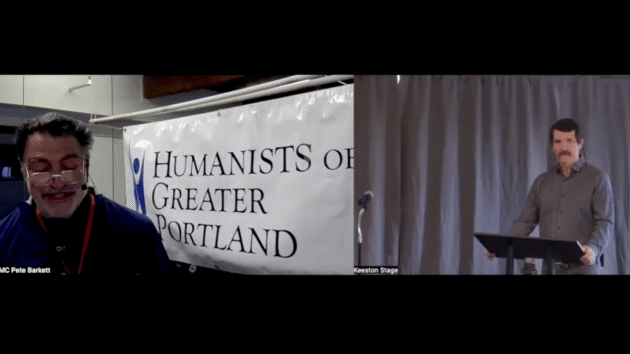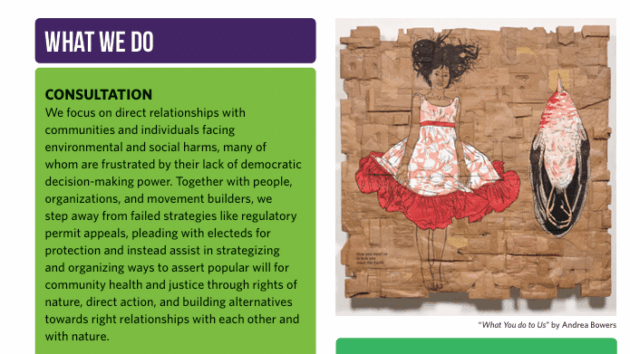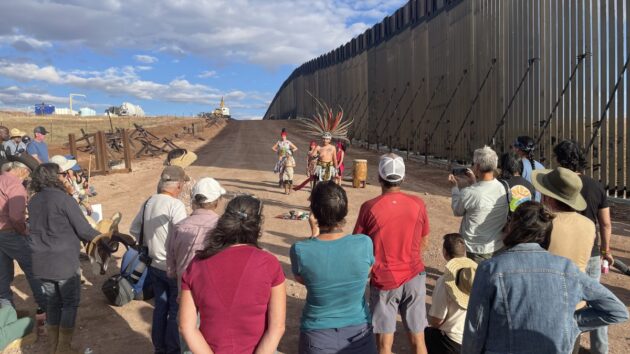Background, and the Problem
It’s a sad story that’s repeated every day: A rural community wakes up one morning to find that it is being targeted as a dumping ground for the latest industrial corporate activity. A couple years ago, in Grant Township, PA, (population 700), residents awoke into a nightmare where an oil and gas corporation was seeking permits to force a Class II injection well into the community.
A Class II injection well. Doesn’t sound so bad, does it? Just check out injection well permits issued by the federal Environmental Protection Agency (EPA), which include nice language like, “in compliance with provisions of the Safe Drinking Water Act.” Don’t worry, the EPA is on the case.
But, you still might wonder, just what is an injection well? A little further down in the permit is language like, “an injection well for the purpose of injecting fluids produced in association with oil and gas production operations.” In other words, it’s a well for injecting fracking wastewater, or as they call it in the industry, “brine,” as if you might soak a turkey in it before roasting. Fracking wastewater can contain cancer-causing chemicals, including benzene, toluene, and xylene, among others.
Is that the only thing that’s bad?
No. You’ll also find in your research that Class II injection wells have been linked to earthquakes from Ohio to Oklahoma to Texas. Emergency shutdowns have been ordered in California. And according to a recent federal Government Accountability Office report, the “EPA is not consistently conducting two key oversight and enforcement activities for class II programs,” mostly due to underfunding.
With all these problems, why are Class II permits being issued? And why are they being issued at an increasingly-frequent rate in places like Pennsylvania, especially with all of these known problems?
An email to the EPA provides perspective. Notes an EPA employee: “There has been increased interest in brine disposal, over the last 3-5 years, since there have been a number of changes in the acceptance of the brine at surface water disposal. It is a matter of economics. When it was less expensive to truck to a surface water treatment plants [sic], there was no need to invest in more costly treatment and disposal options that have been used for many years in other states.”
Translation: the poison being permitted for injection into your community is a “matter of economics;” because surface treatment plants have become more expensive, injection wells are the next most economical means of dealing with the waste. Sorry, folks, earthquakes and injection of cancer-causing chemicals near your town’s water supply are simply efficient byproducts of a regulatory scheme that partners with industry to find the most economical method of getting rid of the wastewater.
If it’s not already clear, here’s the gist: our ‘environmental protection’ agencies are not prioritizing the protection of our communities; rather, their interest, as a matter of economics, is to find ways to permit and regulate harm.
Sure enough, and just like clockwork, the EPA issued a permit to the corporation that hoped to inject in Grant Township. By now, you might be wondering, which corporation is it? Perhaps the corporation has a great safety record, and is well-respected in the Township?
No. That corporation is Pennsylvania General Energy Company (PGE). PGE is a multi-million dollar oil and gas corporation, and listed as one of the top-10 polluters in PA by the Department of Environmental Protection. Hardly the type of corporate “neighbor” that you’d want injecting toxic waste near your drinking water.
Fighting Back
But if the EPA has issued the permit, what other options does your community have? Who do you turn to for help? The folks in Grant Township had an answer: themselves. They stopped asking the EPA for help, and they stopped asking mainstream environmental organizations for help, and they stopped asking their state legislators for help.
Instead, they acted on the authority that they already knew that they had: the unalienable right of self-government in their community. The right of the community, not the corporation, to determine the future of Grant Township.
A community group — the East Run Hellbenders Society (Hellbenders) — formed to do further outreach and education within the Township. The Hellbenders collaborated with their elected Township Supervisors, and the Community Environmental Legal Defense Fund, to draft an Ordinance to prohibit the injection well. The Hellbenders and the Supervisors knew they had to take action to protect the community, even if the EPA would not.
So on June 3, 2014, the Grant Township Board of Supervisors voted unanimously to adopt a Community Bill of Rights Ordinance prohibiting the disposal of oil and gas extraction waste material into injection wells. The Ordinance secures community rights to local self-governance, and clean air and water, by banning injection wells as a violation of those rights.
Following adoption, Grant Township resident Judy Wanchisn stated in a press release, “Pure water is guaranteed to us by the Pennsylvania Constitution under Article I, Section 27. That right is unalienable, and our governments have no authority to negotiate our rights away. With the passing of this Ordinance, we are securing and protecting our community’s rights. Water is our most precious resource, and if we don’t take action to protect it for our community and for future generations, who will?”
PGE Sues, Attempts to Bully Grant Township Into Submission
As you might expect from one of Pennsylvania’s top-10 polluting corporations, PGE didn’t like being told, “No!” So PGE did what thousands of other polluting corporations do when they encounter community resistance: sue the Township. Yes, that’s right, PGE sued the Township on August 8th, 2014, just two months after Grant passed the Ordinance.
In the lawsuit, PGE claims it has a “right” to inject fracking wastewater within the Township. The complaint argues that the Community Bill of Rights ordinance is unconstitutional because it violates the corporate “person’s” civil rights under the 1st and 14th amendments, as well as the Commerce and Supremacy Clauses of the U.S. Constitution. The corporation asks the court to force the Township to pay damages for violating the corporation’s civil rights, and to force the Township to pay for the corporation’s legal fees.
In short, PGE claims that the corporate right to inject toxic waste is a greater, and more important, right than the community’s right to govern itself and protect its water supply.
The Fight Is On
Unbowed by the lawsuit, Grant Township Supervisor Jon Perry, in a press release, summed up the Board’s position, saying “Our duty is to protect the health and safety of Grant Township residents. We’re defending the ordinance.”
In the same press release, Grant Township resident Judy Wanchisn said “Our Declaration of Independence tells us that we’re born with unalienable rights, and protecting those rights is why we create governments. We stand behind our Supervisors in their decision to defend our community’s rights.”
The Grant Township Supervisors voted to retain CELDF to defend the Ordinance on behalf of the Township. CELDF has also been retained by the Hellbenders in an attempt to intervene into the litigation, so that the Hellbenders can support the Supervisors.
Additionally, in a first-in-the-nation action, an ecosystem within Grant Township filed a motion to intervene in the lawsuit. Rights of the Little Mahoning Watershed were secured in the Ordinance, and the filing represents the first time an ecosystem has sought to defend its legally enforceable rights to exist and flourish. As of this writing, the judge in the case has not ruled on the intervention motion.
Litigation in the case continues, but the folks in Grant Township are not simply waiting around for the judge to decide something. As Township resident Judy Wanchisn stated in a letter-to-the-editor on August 8, 2015 — the one-year anniversary of PGE’s filing — “The injection well isn’t wanted here; and it will not be sited here. We will fight as long as necessary to keep our community healthy, safe and free from harmful activities.”
…And The Fight Continues
In May of 2015, seven residents from Grant Township ran nonpartisan political races to sit on a Government Study Commission within the Township. All seven residents won their races, and they got down to work over the summer.
The purpose of the Government Study Commission is to study the existing form of government within the Township, and if deficiencies are found within that form of government, to make recommendations for how government could be improved within the Township.
The existing form of government in Grant Township is administered by something called the Second Class Township Code. As the Commission studied the Code, they found that it was pretty much a one-size-fits-all document that attempts to govern over 1000 PA townships of wildly varying sizes and populations in the same mold. Additional deficiencies identified by the Commission include the lack of a Bill of Rights for Township residents, and the lack of any citizen’s initiative provisions to make law.
Thus, the Commission has now written a new Home Rule Charter for the Township, which includes a Bill of Rights for Township residents, prohibits the injection well, includes citizen’s initiative provisions, includes provisions for fair taxation, and establishes a first-of-its-kind Town Meeting process for passing Emergency Ordinances within the Township. The proposed Charter will be voted on by Township residents in November of 2015.
Said Commission member Judy Wanchisn, “Grant’s commitment to a rights-based local government is so strong we are in the process of writing a home rule charter. Stay tuned.”



